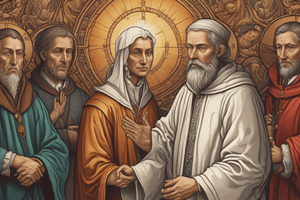Podcast
Questions and Answers
Luther believed that a symbolic view of the Lord's Supper was a view held only by moderate reformers.
Luther believed that a symbolic view of the Lord's Supper was a view held only by moderate reformers.
False (B)
Zwingli's theology was seen as a polite face for extremism by Luther.
Zwingli's theology was seen as a polite face for extremism by Luther.
True (A)
The conflict with Carstadt had no impact on Luther's sacramental thinking on the Lord's Supper.
The conflict with Carstadt had no impact on Luther's sacramental thinking on the Lord's Supper.
False (B)
Luther believed that removing the objective presence of Christ from the sacrament was a necessary step towards justification.
Luther believed that removing the objective presence of Christ from the sacrament was a necessary step towards justification.
Luther's break with Rome was primarily due to disagreements over the Lord's Supper.
Luther's break with Rome was primarily due to disagreements over the Lord's Supper.
Protestantism in Zurich was marked by a strong emphasis on the symbolic view of the Lord's Supper.
Protestantism in Zurich was marked by a strong emphasis on the symbolic view of the Lord's Supper.
Luther's view on justification was centered on the idea of works righteousness.
Luther's view on justification was centered on the idea of works righteousness.
The conflict with Karstatt led to a decrease in Luther's emphasis on the importance of the Lord's Supper.
The conflict with Karstatt led to a decrease in Luther's emphasis on the importance of the Lord's Supper.
According to Luther, the efficacy of the Lord's Supper depends on the actions of the participant.
According to Luther, the efficacy of the Lord's Supper depends on the actions of the participant.
Luther and Zwingli shared similar views on the Lord's Supper.
Luther and Zwingli shared similar views on the Lord's Supper.
Luther saw Zwingli as a fellow Christian.
Luther saw Zwingli as a fellow Christian.
Luther believed that the gospel is found in the Word and in the sacraments.
Luther believed that the gospel is found in the Word and in the sacraments.
Zwingli's theology turned the sacraments into a means of salvation.
Zwingli's theology turned the sacraments into a means of salvation.
Luther's break with Rome was primarily due to his disagreement with Zwingli.
Luther's break with Rome was primarily due to his disagreement with Zwingli.
Protestantism in Zurich was characterized by a unified view on the Lord's Supper.
Protestantism in Zurich was characterized by a unified view on the Lord's Supper.
Luther believed that justification is found in the sacraments alone.
Luther believed that justification is found in the sacraments alone.
According to Luther, John 6 is not a critical passage for understanding the Lord's Supper.
According to Luther, John 6 is not a critical passage for understanding the Lord's Supper.
Luther's view on justification was influenced by the conflict with Carstadt.
Luther's view on justification was influenced by the conflict with Carstadt.
Zwingli was a radical reformer sympathetic to the Zwickau prophets.
Zwingli was a radical reformer sympathetic to the Zwickau prophets.
Luther wrote a treatise against Zwingli, attacking his views on the Lord's Supper.
Luther wrote a treatise against Zwingli, attacking his views on the Lord's Supper.
Luther needed John 6 to support his understanding of the Lord's Supper in 1520.
Luther needed John 6 to support his understanding of the Lord's Supper in 1520.
According to Paul, the Lord's Supper is a matter of literal life and death.
According to Paul, the Lord's Supper is a matter of literal life and death.
Luther's break with Rome was primarily due to his disagreement with Carstadt over the Lord's Supper.
Luther's break with Rome was primarily due to his disagreement with Carstadt over the Lord's Supper.
Zwingli's theology led to a more Calvinistic understanding of the Lord's Supper.
Zwingli's theology led to a more Calvinistic understanding of the Lord's Supper.
The English Reformation started later than the Reformation in Zurich.
The English Reformation started later than the Reformation in Zurich.
Luther's power was still consolidating in 1522.
Luther's power was still consolidating in 1522.
Zurich was ahead of Luther in terms of the Reformation timeline.
Zurich was ahead of Luther in terms of the Reformation timeline.
The town council in Zurich decreed that all teaching within the city should be in accordance with Scripture in 1523.
The town council in Zurich decreed that all teaching within the city should be in accordance with Scripture in 1523.
The Reformation in Zurich was characterized by a strong emphasis on clerical marriage.
The Reformation in Zurich was characterized by a strong emphasis on clerical marriage.
Luther's break with Rome was primarily due to disagreements over justification.
Luther's break with Rome was primarily due to disagreements over justification.
Luther's view on justification was centered on the idea of faith alone.
Luther's view on justification was centered on the idea of faith alone.
The Reformation in Zurich was influenced by Luther's ideas.
The Reformation in Zurich was influenced by Luther's ideas.
Luther's initial break with Rome was primarily due to disagreements over the Lord's Supper.
Luther's initial break with Rome was primarily due to disagreements over the Lord's Supper.
Luther's view on justification was centered on the idea of faith alone.
Luther's view on justification was centered on the idea of faith alone.
In 1520, Luther's major interest was in the metaphysics of Christ's presence in the Lord's Supper.
In 1520, Luther's major interest was in the metaphysics of Christ's presence in the Lord's Supper.
Luther affirmed the presence of Christ in the bread and wine, similar to the Roman Catholic Church.
Luther affirmed the presence of Christ in the bread and wine, similar to the Roman Catholic Church.
Luther believed that the Lord's Supper was a sacrifice offered to God.
Luther believed that the Lord's Supper was a sacrifice offered to God.
Protestantism in Zurich was marked by a strong emphasis on the realist view of the Lord's Supper.
Protestantism in Zurich was marked by a strong emphasis on the realist view of the Lord's Supper.
Luther's criticism of transubstantiation was that it did not affirm the presence of Christ in the bread and wine.
Luther's criticism of transubstantiation was that it did not affirm the presence of Christ in the bread and wine.
Luther's understanding of the Lord's Supper in the 1520s can be divided into three distinct phases.
Luther's understanding of the Lord's Supper in the 1520s can be divided into three distinct phases.
Flashcards are hidden until you start studying
Study Notes
Luther's Mindset on the Lord's Supper
- Luther's conflict with Carstadt fixes in his brain the idea that those who hold a symbolic view of the Lord's Supper are "crazy people"
- This mindset is connected to the peasants' rebellion in 1525 and the potential downfall of the Reformation in 1521-1522
- Luther views Zwingli as the polite face of craziness, and this shapes his perception of Zwingli's views on the Lord's Supper
Luther's Shift in Sacramental Thinking
- The conflict with Carstadt leads to a shift in Luther's writings on the Lord's Supper, focusing on the issue of presence
- Luther argues that removing the objective presence of Christ from the sacrament and making human faith the decisive element turns the Lord's Supper into works righteousness
John 6 and the Lord's Supper
- Luther changes his mind on John 6 being a Eucharistic reference in 1520
- The text of John 6 is crucial for understanding the Lord's Supper, and its interpretation affects one's view of the sacrament
Luther's Emphasis on Presence
- Luther's emphasis on presence in the Lord's Supper is a key aspect of his sacramental thinking
- He views Zwingli's symbolic view of the Lord's Supper as removing the gracious God from the sacraments and turning them into a means of damnation, not salvation
Luther's Phases of Understanding on the Lord's Supper
- There are three phases in Luther's understanding of the Lord's Supper in the 1520s:
- Initial break with Rome and the Roman theology of the mass (Treatise on the New Testament, 1520)
- Correcting the significance of Christ's presence by moving it from sacrifice to promise (1520)
- (Implied) Later developments in Luther's thinking on the Lord's Supper
Zurich Reformation and Luther
- The Zurich Reformation, led by Zwingli, is connected to the events in Wittenberg, where Luther has consolidated his power and the Reformation is set on an irreversible course
- The town council in Zurich decrees that all teaching within the city is to be done in accordance with Scripture, following a debate in July 1522
Studying That Suits You
Use AI to generate personalized quizzes and flashcards to suit your learning preferences.




